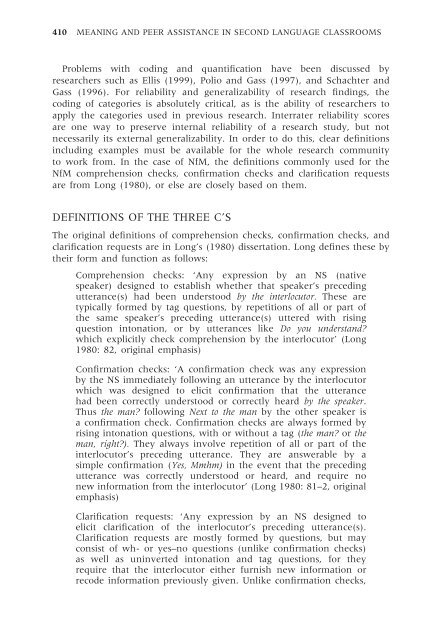Negotiation for Meaning and Peer Assistance in Second Language ...
Negotiation for Meaning and Peer Assistance in Second Language ...
Negotiation for Meaning and Peer Assistance in Second Language ...
You also want an ePaper? Increase the reach of your titles
YUMPU automatically turns print PDFs into web optimized ePapers that Google loves.
410 MEANING AND PEER ASSISTANCE IN SECOND LANGUAGE CLASSROOMS<br />
Problems with cod<strong>in</strong>g <strong>and</strong> quantification have been discussed by<br />
researchers such as Ellis (1999), Polio <strong>and</strong> Gass (1997), <strong>and</strong> Schachter <strong>and</strong><br />
Gass (1996). For reliability <strong>and</strong> generalizability of research f<strong>in</strong>d<strong>in</strong>gs, the<br />
cod<strong>in</strong>g of categories is absolutely critical, as is the ability of researchers to<br />
apply the categories used <strong>in</strong> previous research. Interrater reliability scores<br />
are one way to preserve <strong>in</strong>ternal reliability of a research study, but not<br />
necessarily its external generalizability. In order to do this, clear def<strong>in</strong>itions<br />
<strong>in</strong>clud<strong>in</strong>g examples must be available <strong>for</strong> the whole research community<br />
to work from. In the case of NfM, the def<strong>in</strong>itions commonly used <strong>for</strong> the<br />
NfM comprehension checks, confirmation checks <strong>and</strong> clarification requests<br />
are from Long (1980), or else are closely based on them.<br />
DEFINITIONS OF THE THREE C’S<br />
The orig<strong>in</strong>al def<strong>in</strong>itions of comprehension checks, confirmation checks, <strong>and</strong><br />
clarification requests are <strong>in</strong> Long’s (1980) dissertation. Long def<strong>in</strong>es these by<br />
their <strong>for</strong>m <strong>and</strong> function as follows:<br />
Comprehension checks: ‘Any expression by an NS (native<br />
speaker) designed to establish whether that speaker’s preced<strong>in</strong>g<br />
utterance(s) had been understood by the <strong>in</strong>terlocutor. These are<br />
typically <strong>for</strong>med by tag questions, by repetitions of all or part of<br />
the same speaker’s preced<strong>in</strong>g utterance(s) uttered with ris<strong>in</strong>g<br />
question <strong>in</strong>tonation, or by utterances like Do you underst<strong>and</strong>?<br />
which explicitly check comprehension by the <strong>in</strong>terlocutor’ (Long<br />
1980: 82, orig<strong>in</strong>al emphasis)<br />
Confirmation checks: ‘A confirmation check was any expression<br />
by the NS immediately follow<strong>in</strong>g an utterance by the <strong>in</strong>terlocutor<br />
which was designed to elicit confirmation that the utterance<br />
had been correctly understood or correctly heard by the speaker.<br />
Thus the man? follow<strong>in</strong>g Next to the man by the other speaker is<br />
a confirmation check. Confirmation checks are always <strong>for</strong>med by<br />
ris<strong>in</strong>g <strong>in</strong>tonation questions, with or without a tag (the man? or the<br />
man, right?). They always <strong>in</strong>volve repetition of all or part of the<br />
<strong>in</strong>terlocutor’s preced<strong>in</strong>g utterance. They are answerable by a<br />
simple confirmation (Yes, Mmhm) <strong>in</strong> the event that the preced<strong>in</strong>g<br />
utterance was correctly understood or heard, <strong>and</strong> require no<br />
new <strong>in</strong><strong>for</strong>mation from the <strong>in</strong>terlocutor’ (Long 1980: 81–2, orig<strong>in</strong>al<br />
emphasis)<br />
Clarification requests: ‘Any expression by an NS designed to<br />
elicit clarification of the <strong>in</strong>terlocutor’s preced<strong>in</strong>g utterance(s).<br />
Clarification requests are mostly <strong>for</strong>med by questions, but may<br />
consist of wh- or yes–no questions (unlike confirmation checks)<br />
as well as un<strong>in</strong>verted <strong>in</strong>tonation <strong>and</strong> tag questions, <strong>for</strong> they<br />
require that the <strong>in</strong>terlocutor either furnish new <strong>in</strong><strong>for</strong>mation or<br />
recode <strong>in</strong><strong>for</strong>mation previously given. Unlike confirmation checks,














